Bryant University
Bryant University is a private university in Smithfield, Rhode Island. Until August 2004, it was known as Bryant College.[3] Bryant has two colleges, the College of Arts and Sciences and the College of Business,[4] and is accredited by the New England Association of Schools and Colleges and the AACSB International.[5]
 | |
| Motto | The Character of Success |
|---|---|
| Type | Private University |
| Established | 1863 |
Academic affiliations | Space-grant |
| Endowment | $183.7 million (2018)[1] |
| President | Ross Gittell[2] |
Administrative staff | 265 |
| Students | 3,751 |
| Location | , , United States 41.92545°N 71.53241°W |
| Campus | 428 acres (1.73 km2) |
| Colors | Black & Gold |
| Nickname | Bulldogs |
Sporting affiliations | NCAA Division I Northeast Conference |
| Mascot | Tupper the Bulldog |
| Website | www |
 | |
History

Butler Exchange & downtown Providence
Bryant University was founded in 1863 as a branch of a national school which originally taught bookkeeping and methods of business communication and was named after founders, John Collins Bryant and Henry Beadman Bryant.[6] This separate chain of schools is currently called Bryant & Stratton College. In 1878 the Providence branch of Bryant & Stratton was sold to a teacher at the school, Thomas Stowell. Stowell died in 1916 the school was sold again and merged with Henry Jacobs' Rhode Island Commercial School (founded 1898).[6] Classes for Bryant and Stratton College were originally held in the now demolished Butler Exchange building located in downtown Providence, at 111 Westminster Street on Kennedy Plaza. Bryant became non-profit in 1949 and offered its first master's program in 1969.[6]
College Hill
From August 1, 1935 to 1971, Bryant College of Business Administration campus was located on College Hill near Brown University. Housed first at "South Hall" at the corner of Hope Street and Young Orchard Avenue, formerly Hope Hospital, the college expanded into neighboring buildings. The "South Hall" building was originally the 19th century home of a manufacturing family Sprague, and later the home of Isaac Gifford Ladd.[7] When the school relocated to Smithfield, it sold the Providence campus to Brown University. The property, 26 buildings on 10 acres of land, became known as Brown's East Campus.[8] The former South Hall became home to Brown's music department, and is now called the Orwig Music Center.
Smithfield
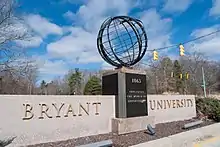
In October 1967, Earl S. Tupper, alumnus and inventor of Tupperware, donated his 428-acre (1.73 km2) hillside estate to Bryant College for the creation of the new campus. To thank Tupper for his generous gift, Bryant named the campus after him and awarded him a second degree, an honorary Ph.D. in Humane Letters. In 1971, the University moved to the new campus. The famous Bryant Archway was also relocated. The old Emin Homestead and Captain Joseph Mowry homestead occupied much of the land that makes up the present day Smithfield campus. The land was purchased and farmed for three generations between the late 19th century and the mid-20th century. Today, many descendants of the original Emin settlers still live near the Bryant campus. The school also claims a handful of family members as alumni and offers a scholarship for accounting students as a tribute to the Emin family. Historical pictures of the Emin Homestead can still be found in the Alumni house.[6]
Bryant Archway tradition
Students at Bryant have a particular way of symbolizing the completion of their education: walking through the archway. The story of the archway dates back to 1875. Isaac Gifford Ladd, an associate of Charles M. Schwab and a famous U.S. steel tycoon, constructed a one million dollar building which contained the iron arch on Young Orchard Avenue on the east side of Providence. This building was meant to be a sign of his endearment to his newlywed wife.[9]
However, his wife expressed hatred for the structure which was named after her. He took this as a personal rejection, and Ladd later took his own life. The building remained unoccupied until Thomas Marsden transformed it into Hope Hospital, which was part of Bryant College. To provide more space for classes, an addition was constructed and Hope Hospital was renamed South Hall. Four years later, prior to the school's move from Providence to Smithfield, the wrought-iron arch at the entrance to South Hall was transported to the new campus.[9]
Today, the archway remains the only physical link to the Providence campus. After the archway was transferred from the old campus, students immediately began to avoid passing through this out-of-place structure. As a rumor had it, walking through the archway before graduation mysteriously jeopardized chances of graduating. Since this is quite a large price to pay for not following tradition, most students opted not to take the chance, which has resulted in worn paths around the arch. This tradition has shaped the behavior of thousands of Bryant University students on Tupper campus for the past 30 years, and has become a focal point in the legend and mystique of Bryant.[9]
Archway seal
The Bryant Seal represents the educational mission of the university and its worldwide implications. The central symbol is an ellipsoid globe with quills on each side to signify the traditional emblem of communication in business. In the center, behind the globe, is a torch symbolizing liberty, the spirit of free inquiry, academic freedom, and learning. The Archway, forming the background for the globe, torch, and quills, is a University landmark affectionately and superstitiously by Bryant alumni. The Latin motto expresses the purpose of the University: "Cognitio. Virtus. Successus." – Which means Knowledge. Character. Success. The original Latin motto has remained unchanged and has been translated into the university's current day motto which is The Character of Success.[9]
Presidents
Ronald K. Machtley is the eighth president of Bryant University.[10]
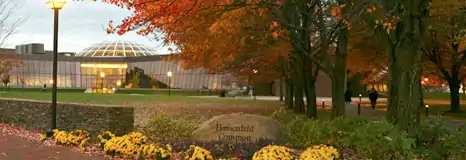
- Theodore Stowell, 1878–1916
- Henry L. Jacobs, 1916–1961
- E. Gardner Jacobs, 1961–1970
- Schyler Hosler, 1969–1970
- Harry F. Everts, 1970–1976
- William T. O'Hara, 1976–1989
- William E. Trueheart, 1989–1996
- Hon. Ronald K. Machtley, 1996–present
Troubled times
Bryant continued to grow after the move to Smithfield, but began to face serious problems starting in the early 1990s. Nationwide, the number of students applying to college had dropped precipitously, and Bryant was no exception. Applications and interest in the college were way down and enrollment had dropped to below 2,000 students. Three of the school's 16 dormitories sat empty; two were converted to administrative use. Although the campus was clean and well-maintained, Bryant's facilities needed upgrading. Bryant wrote its accounts with red ink throughout the early part of the decade, and at its worst, the school had a $1.7 million budget deficit.
The Machtley era
Ronald K. Machtley, a former Navy captain and U.S. Representative, was hired as president in 1996. When Machtley arrived he immediately began working with faculty, students and the Board of Trustees to ensure the future of Bryant. He announced an ambitious capital campaign and plans to build new facilities and upgrade old ones. Under the Machtley administration, Bryant has built a new library, athletic center, communications and IT complex, residence hall, interfaith center, upgraded all athletic fields, and completely renovated the main classroom building and the student union. The school also changed its name to Bryant University in 2004. Its selectivity has increased, and the days of budget deficits are gone. The university endowment in 2007 totaled $171 million, a net increase of $169 million in just 10 years.[11]
On Thursday, February 28, 2008, former U.S. President Bill Clinton campaigned at Bryant University in support of Hillary Clinton's bid for the Democratic presidential nomination. This was the first time in the school's history that either a former U.S. president or presidential candidate came to Bryant University to give a speech. Also in 2008, the 41st President of the United States George H. W. Bush gave the 2008 Commencement Address on May 17, 2008. Bush received an honorary degree from the University. Within only three months of each other, Bryant had two of the only three former U.S Presidents still living come to speak on campus.
Campus buildings
George E. Bello Center for Information and Technology

This 71,000-square-foot (6,600 m2) building houses the college library, previously located in the Unistructure.
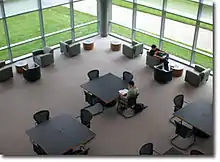
The George E. Bello Center for Information and Technology was designed by Gwathmey Siegel & Associates Architects, a firm in New York City that has been nationally recognized for its design of the Science, Industry, & Business Library (SIBL) for the New York Public Library.
Unistructure
The Unistructure is the center of Bryant's academic activity. It currently contains nearly all classrooms, most faculty and administrative offices, and many academic resources.
The Michael E. '67 and Karen L. Fisher Student Center

The Fisher Student Center (known as the Bryant Center until September 2013) offers offices and meeting spaces for a wide variety of co-curricular activities, clubs and student organizations. [12]
Koffler Verizon Communications Complex

The Koffler Technology Center is Bryant's computer center. More than 200 terminals, microcomputers, and workstations are located here. Facilities offer individual workstations for hands-on learning and shared workstations for group projects.
The Koffler center is also home to the university's TV and radio stations. WJMF takes up most of the main floor, sharing space with the TV/Editing studio.
John H. Chafee Center for International Business
The building was named after the late Rhode Island Senator John Chafee. The Center serves the regional business community, as well as offering hands on opportunities for students to learn about global business. The Chafee Center houses the World Trade Center and Export Assistance Center for the state of Rhode Island.
Suite Village
The Suite Village is a collection of fourteen residence halls with thirteen of them (Charlestown, Richmond, Kilcup, Westerly, Hopkinton, Exeter, Coventry, Scituate, Tiverton, Providence, Jamestown, Cumberland and Lincoln) housing 90 students. The last and the newest, hall seventeen (Newport House), houses approximately 200 students. Every suite has three double bedrooms, a living area and private bathroom with multiple stalls and showers. Each of the four floors has four suites, with each suite separated by gender.[13][14]
First Year Complex
These three halls (Warren, Bristol and Barrington) – are entirely reserved for first-year students – are four-story, co-educational halls with north and south wings.[13]
Ronald K. and Kati C. Machtley Interfaith Center

The Interfaith Center opened at the start of the 2009–2010 academic year to replace the previous chapel in the Bryant Center. Located between the Bryant Center and the George E. Bello Center for Information and Technology, it is a 11,000-square-foot (1,000 m2) non-denominational place of worship and reflection for all members of the campus community. The center, designed by Gwathmey Siegel & Associates Architects, a firm in New York City that has been nationally recognized for its work, has received two design awards: a 2010 Honor Design Award from Faith & Form magazine/The Interfaith Forum on Religion, Art and Architecture, and a Building of America Award from Construction Communications magazine for the center's use of sustainable materials.
On October 9, 2010, the Board of Trustees honored President Ronald K. Machtley and his wife Kati C. Machtley by dedicating the Interfaith Center in their names.[15]

Salmanson Dining Hall
Salmanson Dining Hall, inside the Unistructure, was named after Leonard I. Salmanson in 1973. Prior to this time, it was said that Salmanson made one donation which was one of the largest Bryant had ever received up until this time. Bryant awarded Salmanson an honorary degree of Doctor of Science of Business Administration in 1972 and he became a Bryant trustee in 1974.[16]
Academic Innovation Center
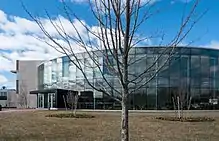
The Academic Innovation Center is a 50,000-square-foot building housing classrooms, breakout rooms, an innovation forum, admission greeting center, and cafe.[17]
Bulldog Strength & Conditioning Center
The 10,000-square-foot Bulldog Strength & Conditioning Center is used by students who are members of the Bulldog Division I and club sports athletic teams.[18]
Residence life
Bryant residence life guarantees housing for all four years, although off-campus housing is a growing trend. Bryant also has a strict drug policy, which involves the Smithfield Police Department in all cases of violations. In 2010 Smithfield Police were able to arrest 34 Bryant students for possession of marijuana.[19] This placed the school at number 4 on The Daily Beast's 2011 list of druggiest colleges. In 2010 the school placed at number 2 on the list.[20] The University "unequivocally" rejected the characterization, called The Daily Beast's representations "without foundation," and considered the methodology "badly flawed."[21]
Academics
Schools and programs
Bryant University is divided into two colleges: the College of Business, and the College of Arts and Sciences. Each offers undergraduate and graduate degrees. Most students are enrolled in a business discipline.
All students in a business administration major are required to complete one of the 27 liberal arts minors. Students in the Bachelor of Science in International Business program are required to complete a language minor. All students majoring in the College of Arts and Sciences also complete a business minor.[22]
Centers and institutes
- Advanced Applied Analytics Center[23]
- John H. Chafee Center for International Business[24]
- Hassenfeld Institute for Public Leadership[25]
- Center for Global and Regional Economic Studies[26]
- Center for Program Innovation[27]
- U.S.-China Institute[28] and Confucius Institute[29]
- Amica Center for Career Education[30]
- Executive Development Center[31]
- Center for Teaching and Learning[32]
Reputation and rankings
- In 2017, Bryant University President Ronald K. Machtley was the highest paid college president in the United States. At $6,283,616, Machtley was paid $920,000 more than the second highest paid college president.[33]
- 9th best Master's University in the North as ranked by U.S. News and World Report.
- Tier One MBA program – CEO Magazine 2016 [34]

Athletics

Bryant has 22 intercollegiate varsity athletic programs and participates in NCAA Division I as a member of the Northeast Conference. Athletic squads are called the Bulldogs. In addition, students can compete in various club sports and on intramural teams throughout the academic year.
The school's basketball team reached the NCAA Division II Championship Game against Virginia Union in 2005, and has not only made the NCAA Division II tournament, but made it to at least the Sweet Sixteen the past four years. The baseball team reached the Division II College World Series in 2004, and has hosted the Division II College World Series regionals.
The Football team for the first time in school history reached the NCAA Tournament in 2006, losing in the Regionals 31-29 to West Chester University. The 2006–2007 was the best season to date in the program's short history. The following season (2007–2008) the team had an even more successful year. It won the NE-10 outright, starting the season with a seven-game winning streak.
Bryant Athletics won the Northeast-10 Conference's Presidents' Cup in 2004, 2005, and 2007. Bryant lost the Presidents' Cup by only one point in 2006 to Stonehill College.
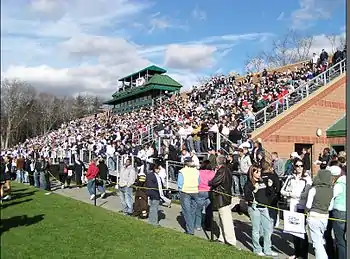
Bryant has 11 varsity teams for men and 11 for women: baseball, basketball, cross country, American football, golf, lacrosse, indoor and outdoor track and field, tennis, soccer, and swimming and diving. The women's teams consist of basketball, cross country, field hockey, lacrosse, indoor and outdoor track and field, soccer, softball, swimming and diving, tennis, and volleyball.[35]
Bryant University also offers sports at the club level. They offer 20 club level sports teams, 10 for men and 10 for women. The men's club sports are: bowling, hockey, karate, racquetball, crew, rugby, skiing and snowboarding, ultimate frisbee, wrestling, and volleyball. The women's club sports include bowling, cheerleading, gymnastics, hockey, karate, ice skating, racquetball, rugby, skiing and snowboarding, and dance.[35]
Move to Division I
In the summer of 2007 the University made a public announcement that it had filed paperwork to begin the transition to Division I athletics. At that point the university was looking at four possible conferences to call home once the transition was complete: the Patriot League, America East Conference, Metro Atlantic Athletic Conference and the Northeast Conference. On Thursday, October 18, 2007, Bryant announced it would join the Northeast Conference, and became a full member in 2012.[36]
Greek life
Bryant University has a growing Greek Life on campus, with two of the oldest chapters dating to 1944. Currently, there are four fraternities and four sororities. While Bryant does not allow Greek housing, Charlestown House is made up of only Greek Life.
Fraternities
- Delta Chi- Bryant Chapter – Founded 1989
- Delta Kappa Epsilon- Phi Sigma Chapter – Founded 1991
- Sigma Chi- Lambda Eta Chapter – Founded 2010
- Tau Kappa Epsilon- Lambda-Phi Chapter – Founded 1968
Sororities
- Alpha Omicron Pi- Beta Upsilon Chapter – Founded 2012
- Alpha Sigma Alpha- Gamma Chi Chapter – Founded 2017
- Delta Zeta- Omicron Delta Chapter – Founded 1986
- Sigma Sigma Sigma- Zeta Alpha Chapter – Founded 1990
Student life
There are over one hundred Recognized Student Organizations on campus. 85 percent of students reside on campus, with living options ranging from traditional dormitories to suites to townhouse apartments. The university has four fraternities and five sororities, and approximately eleven percent of students belong to these organizations. A total of 76 percent of students are involved in extra-curriculars, and most work in internships or co-ops before graduating.
Bryant University's chapter of the Collegiate Entrepreneurs' Organization, or CEO, has been recognized nationally for their reputation on the Bryant campus and beyond. Bryant CEO hosts the Bryant University Northeast Entrepreneurship Conference (BUNEEC, pronounced "be unique"), which draws in students and faculty from the New England area. Past speakers have included Steve Forbes, Kevin Harrington, Marques Ogden, and other entrepreneurs from across the nation.
Alumni
Bryant University has over 39,000 active and donating alumni.
References
- As of June 30, 2018. "Bryant University Audited Financial Statements" (PDF). 2018 Consolidated Financial Statements. KPMG LLP.
- "Bryant University Board of Trustees announces appointment of Economist and CCSNH Chancellor Dr. Ross Gittell as Bryant's Ninth President". Bryant News (Press release). March 4, 2020. Retrieved November 27, 2020.
- Bryant University – About Bryant : Historical Highlights Archived August 10, 2007, at the Wayback Machine
- Bryant University – Academics : Undergraduate Degree Programs : Home Archived August 10, 2007, at the Wayback Machine
- Bryant University – About Bryant : Quick Facts Archived December 23, 2007, at the Wayback Machine
- "providencejournal.com: Local & World News, Sports & Entertainment in Providence, RI". providencejournal.com. Retrieved February 26, 2018.
- "South Hall". Retrieved February 26, 2018.
- "Encyclopedia Brunoniana – Bryant College". www.brown.edu. Retrieved February 26, 2018.
- Bryant University: One Hundred and Forty Fifth Historic Ceremony, William T. Guay Pp. 2.
- "Douglas and Judith Krupp Library – Home". web.bryant.edu. Retrieved February 26, 2018.
- Class of 2011 convocation Archived September 5, 2007, at the Wayback Machine
- "Home Page". Bryant Student Center Renovation. Retrieved February 26, 2018.
- Bryant University – Living on campus Archived February 20, 2008, at the Wayback Machine
- Bryant Opens Residence Hall 17 in 2007 Archived December 17, 2007, at the Wayback Machine
- "Archived copy". Archived from the original on July 19, 2011. Retrieved 2010-10-11.CS1 maint: archived copy as title (link)
- "Douglas and Judith Krupp Library – Unistructure Named Spaces – Salmanson Dining Hall". library.bryant.edu. Retrieved February 26, 2018.
- "Bryant announces historic building program – Bryant University". www.bryant.edu. Archived from the original on February 27, 2018. Retrieved February 26, 2018.
- "News – Bryant University". www.bryant.edu. Archived from the original on February 27, 2018. Retrieved February 26, 2018.
- "Druggiest Colleges in U.S.: Colorado, Denison, Dartmouth, Kenyon, More". December 1, 2011. Retrieved February 26, 2018 – via www.thedailybeast.com.
- "Druggiest Colleges". December 11, 2010. Retrieved February 26, 2018 – via www.thedailybeast.com.
- "Archived copy". Archived from the original on September 11, 2013. Retrieved September 11, 2013.CS1 maint: archived copy as title (link)
- http://www.bryant.edu/resources/files/Academics/Bryant_Course_Catalog_2013_2014.pdf%5B%5D
- "Advanced Applied Analytics Center – Bryant University". www.bryant.edu. Retrieved February 26, 2018.
- "John H. Chafee Center for International Business – Bryant University". www.bryant.edu. Retrieved February 26, 2018.
- "Hassenfeld Institute for Public Leadership – Bryant University". www.bryant.edu. Retrieved February 26, 2018.
- http://intranet.bryant.edu/public/economic-studies/%5B%5D
- "Center for Program Innovation – Bryant University". www.bryant.edu. Retrieved February 26, 2018.
- "U.S.-China Institute – Home". china.bryant.edu. Retrieved February 26, 2018.
- "U.S.-China Institute – Confucius Institute". china.bryant.edu. Retrieved February 26, 2018.
- "Bryant University – Amica Center for Career Education". career.bryant.edu. Retrieved February 26, 2018.
- "Executive Development Center". edc.bryant.edu. Retrieved February 26, 2018.
- "Centers for Student Success – Bryant University". www.bryant.edu. Retrieved February 26, 2018.
- Dan Bauman, Tyler Davis, and Brian O’Leary (January 14, 2020). "Executive Compensation at Public and Private Colleges". The Chronicle of Higher Education. Retrieved May 29, 2020.CS1 maint: multiple names: authors list (link)
- Čeština (February 9, 2016). "CEO Magazine Releases Its 2016 Global MBA Rankings". LinkedIn. Retrieved February 26, 2018.
- "College Search – Bryant University – Sports". Apps.collegeboard.com. Retrieved February 26, 2018.
- "NEC Press Release". Archived from the original on July 27, 2011. Retrieved February 26, 2018.
- "Bryant Archway – The Voice of Bryant University". www.bryantarchway.com. Retrieved February 26, 2018.
- "Bryant University Koffler TV Studio – Global Media Projects". bryant2.bryant.edu. Retrieved February 26, 2018.
- "WJMF – The Beat of Bryant". www.wjmfradio.com. Retrieved February 26, 2018.